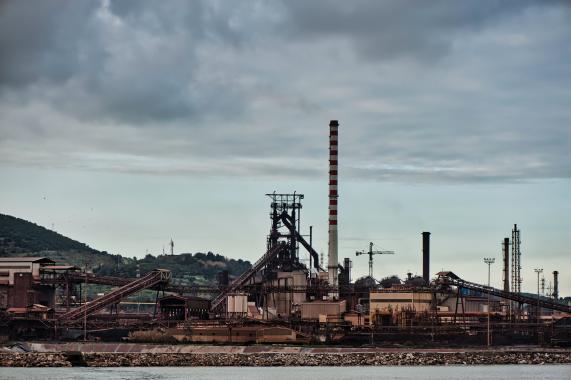Industrial land, anticipation as the key word

The report on the “national mobilization strategy for industrial land” develops the idea that France would have numerous assets to become a major industrial power again, while respecting the land sobriety issue of the climate and resilience law. Reconciling everything is a long distance race that pays off.
It's a fact... Industrial land has become a worrying subject for the manufacturers themselves, the State and the communities who are very actively seeking solutions so as not to slow down the industrial renewal that the country is experiencing.
The State's numerical estimates demonstrate that increasing the share of industry in GDP by two points by 2030 requires developing 22,000 hectares of land. Industry already occupies 4.5% of artificialized areas, or 227,561 hectares.
To limit as much as possible the environmental impact of the country's reindustrialization, land needs can, in part, be met by densifying existing industrial sites and rehabilitating wastelands. These two components would provide 13,500 hectares to accommodate the new activities. An achievable objective: France has more than 8,300 urban, industrial and military wastelands, which represent between 87,000 and 170,000 hectares.
Launch of Time II 2023-2027 of Territories of Industry
Beyond the figures, on November 9, the launch of Time II 2023-2027 of Territoires d'industrie made it possible to take stock. “With 90,000 jobs created and the net creation of 300 factories since 2017, French industry is raising its head. We must continue and amplify this dynamic. The green industry law will be an essential vector, with measures dedicated to accelerating environmental authorization procedures, public procurement and industry financing. Beyond this law, it is partnership work that must be undertaken with all local elected officials. On May 11, during the presentation of the country's reindustrialization strategy, the President of the Republic announced the launch of the second phase of the “Territories of Industry” program. An eminently territorial, bottom-up program, based on local governance involving both elected officials and business leaders, and on teamwork between all public actors. Today, the map of this program is being revised, as is the program's service offering, while maintaining its flexible, transversal and partnership philosophy with communities. The issues of land, skills, ecological transition and innovation will be significant in this new phase,” warns Roland Lescure, Minister Delegate for Industry.
“National ambitions in terms of green reindustrialization can only go through the territories and local authorities which benefit from in-depth knowledge of local issues and proximity to the economic ecosystems to be developed. Phase II of the Territories of Industry program, supported by the ANCT, will offer a renewed service offering, particularly in engineering, to meet the needs defined by local stakeholders and support them in the implementation of more than 2,000 projects already identified in favor of industrial development", adds Stanislas Bourron, Director General of the National Agency for Territorial Cohesion.
How it works ? For this new phase, Territoires d'industrie thus maintains its bottom-up approach to projects and its tripartite governance which is based: on the local level with an approach led by an elected-industrial pair supported by a project manager; on the regional level with State-Region co-management to coordinate the approach, define strategic orientations; and finally at the national level, on monitoring the coordination of the service offering and the operational deployment of commitments made by the State and partner operators.
If “Territories of Industry is a catalyst for local projects which makes it possible to develop a last mile industrial policy” as Thomas Courbe, Director General of Companies, puts forward, the work to be carried out requires real coordination.
The vision and expectations of the field…
“Local authorities are finding it more and more difficult to offer land, both small towns and large metropolises. Sometimes, this is simply due to the scarcity of land, sometimes to a proactive policy against the artificialization of land. Indeed, the objectives of “zero net artificialization of land” restrict local initiatives in favor of reindustrialization. Finally, competition is keen with developers specializing in residential real estate,” testifies (in an interview with Arts et Métiers Magazine) Christian Schor, co-founder of La Fabe, a company specializing in the development of “ready-to-use” industrial land. employment” and pioneer of connected and sustainable “smart buildings”.
On the local authority side, Alain Chrétien, mayor of Vesoul and president of the Vesoul urban community, explains in the columns of Localtis that “nothing can be done in terms of reindustrialization without mayors. We are 100% in favor of the reindustrialization of the country and land sobriety and we are used to managing contradictory injunctions for the benefit of the general interest and the environment.”
However, the councilor concedes that only anticipation is required. “We sought very early on, from 2013, to rehabilitate old land but also to create new economic spaces, in this case an activity zone of 40 hectares […] it took ten years to acquire the land, obtain authorizations, taking out loans... It's a very long procedure: ten years between the first decision and the start of work! Companies don’t wait, they go elsewhere.”
If time remains an obstacle, the Territories of Industry program, which has just entered phase II, announces 183 new winners in addition to the 149 territories already members, proof that the territorial dynamic has indeed been launched.
Our other news
See allJoin the largest community of industrial suppliers
- Helping you with your ongoing technology watch
- Provide you with detailed supplier statistics
- Give you international visibility
Discover the largest catalogue of industrial products on the market
- To offer you the best catalogue of industrial products on the market
- To guarantee you a 100% secure platform
- Enable you to have live remote exchanges


 Français
Français 







